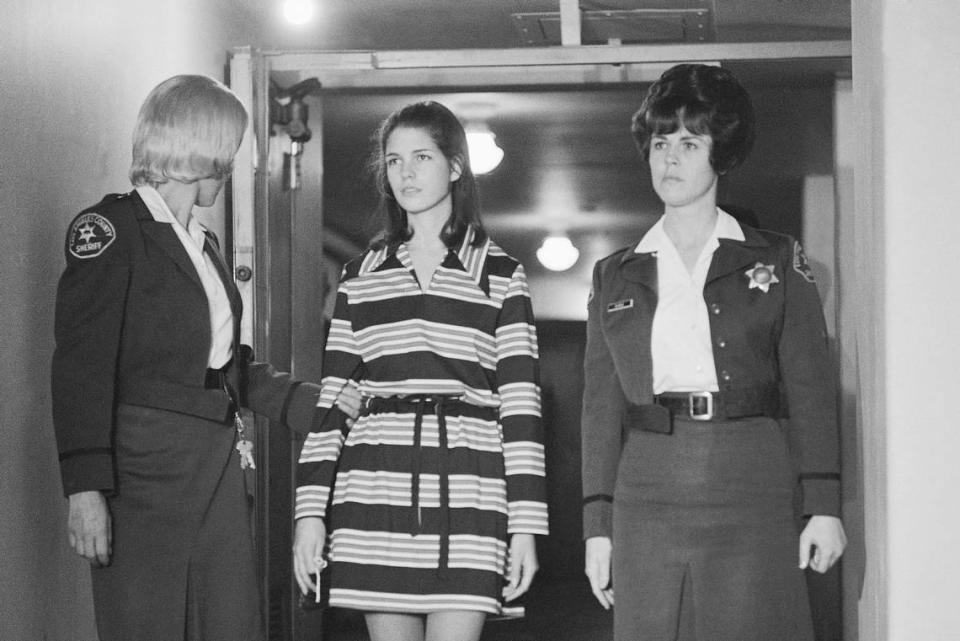We want justice for everyone else — but mercy for ourselves | Opinion
- Oops!Something went wrong.Please try again later.
This isn’t a column about Leslie Van Houten. This is a column about the often competing virtues of justice versus mercy.
But the news event that started me thinking (again) about those dueling impulses was the recent announcement that Van Houten, a former member of Charles Manson’s “family,” will soon be paroled from prison.
She didn’t take part in the infamous 1969 slaughter of actress Sharon Tate and six others in Los Angeles. But shortly afterward she was involved in the gruesome murders of supermarket executive Leno La Bianca and his wife Rosemary.

Van Houten, then 19, held down Rosemary La Bianca while Charles “Tex” Watson stabbed her repeatedly. She then stabbed Rosemary 14 times herself and used the La Biancas’ blood to write messages on the walls of their home.
She was sentenced to death in 1971, as were Manson and three other followers. But the following year California abolished its death penalty. Van Houten’s sentence was commuted to life in prison with the possibility of parole.
She’ll soon turn 74. She’s spent more than a half-century in prison.
As the Washington Post reported: “Van Houten is the first person convicted in the Manson Family murders to be released on parole, after showing what the California Board of Parole Hearings called ‘extraordinary rehabilitative efforts’ and remorse.”
Reading that Van Houten would be released, I was surprised by the tenor of the readers’ comments that followed the various stories.
Here was the “most-liked” comment on one Washington Post story: “She killed innocent people. It is difficult to imagine the fear and terror these poor victims experienced at the hands of this person. She needs to die in prison. She should never be released.”
And a portion of the second-most-liked: “Plenty of people do stupid things in their late teens/early 20s, and yet somehow manage to not viciously murder innocent strangers … There is something fundamental missing in a person who does that. She has already had the mercy of growing old, something she denied the LaBiancas. No parole.”
Some readers did argue that nothing would be accomplished by continuing to keep a repentant septuagenarian in jail.
But the prevailing sentiment was that no matter how old or transformed Van Houten might be — she’s had extensive therapy, admitted her guilt, expressed remorse — none of that matters. She ought to rot in jail until she’s 75 or 90 or 100. No reprieves.
Again, this isn’t really a column about Van Houten.
As I scrolled through the comments, I thought not so much about her but, in a larger sense, about our society. In 21st-century America, can any amount of repentance ever be enough?
We seem remarkably unforgiving now, not just toward murderers but toward anybody who’s remotely offended us—espoused the wrong political view or cut us off in traffic.
Should our goal be to consider everyone who’s done something wrong as dead to us, forever, or should it be to help them — and us — find redemption? If both justice and mercy are important, as I believe they are, how do we find the proper balance? And, assuming we’ll probably err in striking that balance, should we err on the side of justice — exacting an eye for an eye, a life for a life — or on the side of mercy?
I don’t know any definitive answers here. I prefer to approach such problems from a Christian perspective, but even Christians can’t agree.
So I’ll just tell you what I think.
Justice matters, whether we’re talking about the egregious crimes of Van Houten, or far lesser offenses such as theft or drug dealing, or even petty, non-criminal irritations such as our fellow church members spreading gossip about us.
Those who’ve been victimized (or in the worst cases, their survivors), deserve to be heard. Where restitution is possible, it should be made, be it voluntary or compulsory.
If criminal wrongdoers — murderers, rapists, robbers — pose an ongoing threat, they should be locked up until they’re not a threat. Even those who aren’t criminals — serial slanderers, incessant troublemakers — perhaps need to be censured or even shunned.
But there must be room also for mercy. For everyone. Up to and including a Van Houten.
Because if the victim of an offense is a child of God, made in God’s image — then so is the offender.
We should decline to inflict endless pain on a wrongdoer long after an offense, simply for the sake of vengeance.
There ought to be a statute of limitations for everybody, from killers to mere jerks, if she’s trying to do better, if he’s chosen a new life.
Wrongdoers should be offered a road back, if they care to take it. Sometimes, with time and hard work, people truly do grow and change.
I heard somebody say that justice is what we want for everybody else, but mercy is what we want for ourselves.
If we desire mercy, we should be eager to show it. Fifty-four years after her vicious, inexcusable crimes, Van Houten isn’t the same person she was in 1969. None of us is the same person today we were at 19. Van Houten’s an old woman now.
If I’d been on the parole board, I would’ve voted to release her.

Paul Prather is pastor of Bethesda Church near Mount Sterling. You can email him at pratpd@yahoo.com.

